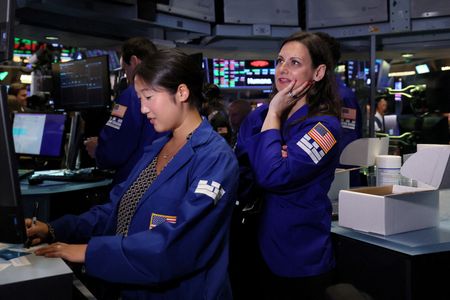By Sinéad Carew
NEW YORK (Reuters) – A global index of stocks closed Wednesday’s choppy session slightly lower to extend the previous day’s sharp sell-off, as oil prices rallied and U.S. Treasury yields climbed along with the dollar.
U.S. crude oil futures briefly nudged above $94 per barrel, intensifying concerns about rising gasoline prices and their impact on inflation and consumer spending.
And the dollar index hit a 10-month high as it pushed the euro to a 9-month low, keeping the yen in intervention territory as investors bet the United States will cope better with higher interest rates than other economies.
Stocks and bonds have been dropping in price in recent weeks as investors prepared for the prospect that central bankers will hold interest rates “higher for longer” than previously expected, to try to squeeze inflation out of global economies.
Irene Tunkel, chief U.S. strategist at Montreal-based BCA Research, saw the increase in oil prices, interest rates and the U.S. dollar as a “triple whammy for U.S. equities” as investors worried about the impact on the economy.
And on top of this, they are also monitoring Detroit’s auto worker strikes and as well as the uncertainty of a potential U.S. government shutdown in coming days.
“Investors are filled with apprehension right now over interest rates, the price of oil and labor relations,” said Steven Wieting, chief investment strategist at Citi Global Wealth. “The volatility of the bond market is spilling over into the stock market.”
The Dow Jones Industrial Average fell 68.61 points, or 0.2%, to 33,550.27, the S&P 500 gained 0.98 points, or 0.02%, to 4,274.51 and the Nasdaq Composite added 29.24 points, or 0.22%, to 13,092.85.
The pan-European STOXX 600 index earlier closed down 0.18%.
MSCI’s gauge of stocks across the globe shed 0.15%. Trading during the day was choppy however with a 0.7% decline at session low and a 0.2% increase at the intraday peak.
Late in the session, Michael James, managing director of equity trading at Wedbush Securities in Los Angeles, said people were looking for a reason to push the market higher given how over-sold it looked.
The global index had lost 1.2% on Tuesday and Wednesday marked its ninth consecutive daily decline. It has fallen 4.7% since the start of September, tracking for its biggest monthly loss in a year.
In U.S. Treasuries, after falling as low as 4.49% earlier in the day, benchmark 10-year notes were up 5.4 basis points to 4.612%, from 4.558% late on Tuesday. The 30-year bond was last up 2.2 basis points to yield 4.718%, from 4.696%. The 2-year note was last was up 6.3 basis points to yield 5.1395%, from 5.077%.
In currencies, investors are on the lookout for government intervention in the Japanese yen as it has been approaching 150 per dollar, which is seen as the level at which Japan could intervene.
The yen fell 0.39% versus the greenback at 149.65 per dollar after hitting its weakest level against the U.S. currency in roughly a year.
The dollar index, which measures the greenback against a basket of major currencies, eying its fourth straight day of gains, was last up 0.461%, while the euro down 0.65% to $1.0501. Sterling was at $1.2133, down 0.20%.
“The U.S. is most able to cope with these new challenges — higher interest rates and higher energy prices,” said Marc Chandler, chief market strategist at Bannockburn Global Forex in New York, citing the depth of U.S. capital markets and households that are more immune to rising interest rates.
“Yes, these are major headwinds, but the U.S. still looks like the driest towel on the rack. The news from Europe isn’t really that good,” Chandler added.
Oil prices surged on Wednesday marking their highest settlement in 2023 after a steep drop in U.S. crude stocks compounded worries of tight global supplies.
U.S. crude settled up 3.6% at $93.68 per barrel, in its highest settlement since August 2022. It had touched $94.04 during the session. Brent settled at $96.55, up 2.76% on the day, for its highest settlement since November 2022.
(Reporting by Sinéad Carew, Herbert Lash, Lewis Krauskopf and Karen Brettell in New York, Harry Robertson in London and Julie Zhu in Hong Kong; Editing by Elaine Hardcastle, Will Dunham, Alison Williams and Daniel Wallis)





